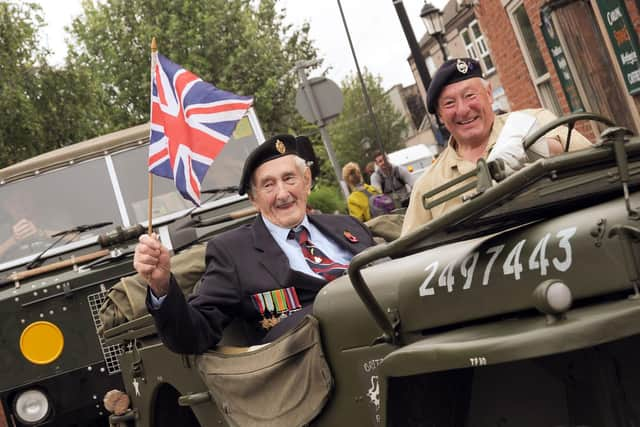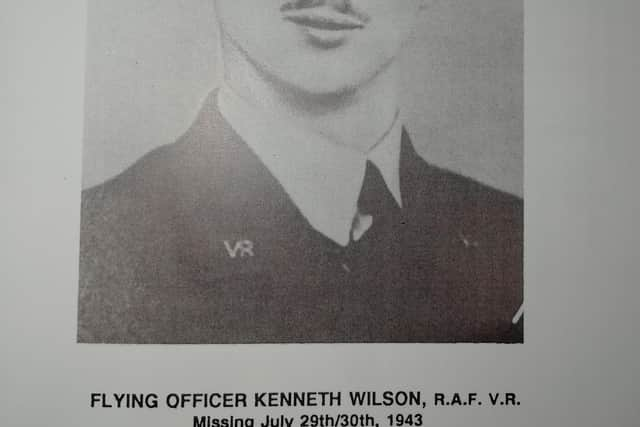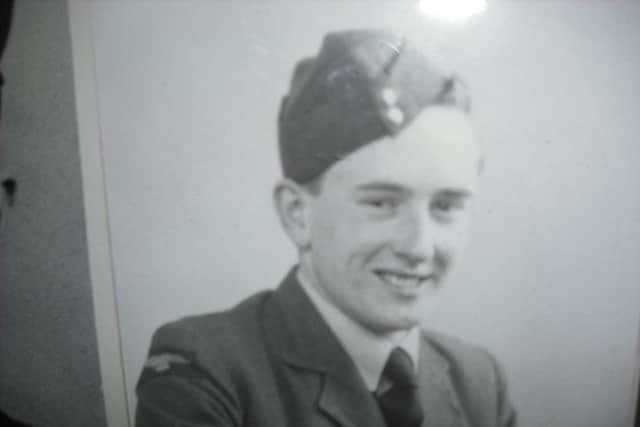Chesterfield pensioner uncovers military secrets to honour RAF hero brother who died in German bombing raid
and live on Freeview channel 276
RAF Flying Officer Ken was on leave and had come home to visit his family in Old Whittington, Chesterfield.
"He hugged me, my sister and my mum and dad, and then he was gone,” John, now 90, said. “We never saw him again.”
Advertisement
Hide AdAdvertisement
Hide AdKen was just 22 and was due to get married just a few weeks later.


On the night of July 29/30 1943, Ken and his fellow crewmen from 78 squadron were flying back from a night-time bombing raid on the German port city of Hamburg.
Their Halifax aircraft, JD 252, was never seen again, and the crew did not return home.
Ken and John’s parents went to their graves without knowing what had happened – a ‘wrong’ John was determined to make right.


Advertisement
Hide AdAdvertisement
Hide AdJohn, who followed in his brother’s footsteps to serve in the RAF himself, researched the events of that night in the skies over Germany and the North Sea to find out what really happened.
The unexpected book that emerged has been read by the Queen and Dame Vera Lynn, and has found its way into libraries, museums and shops as far away as the United States, Canada and Australia.
Now as we approach another Remembrance Sunday, one expected to be very different because of a new global crisis, John’s book has meant his brother will not be forgotten by future generations.
"I know Remembrance Sunday won’t be like it usually is,” John said. “But I’ve already got a wreath and I’m determined to do what I can.


Advertisement
Hide AdAdvertisement
Hide Ad"Despite the difference in age, Ken and I got on well. He was a great guy.”
By the summer of 1943, the tide of the Second World War had turned in the Allies favour and Bomber Command was targeting key industrial targets in Germany.
The Battle of Hamburg, codenamed Operation Gomorrah, was a campaign of air raids which began on July 24.
Lasting for eight days and seven nights, it was, at the time, the heaviest assault in the history of aerial warfare.
Advertisement
Hide AdAdvertisement
Hide AdOn the fifth day, a force of 77 aircraft left Bomber Command airfields in England to attack Hamburg.
The force was made up of 340 Lancasters, 224 Halifaxes, 119 Stirlings, 70 Wellingtons and four Mosquito Pathfinders.
The mission was recorded as being ‘successful’ despite the loss of 28 aircraft – 11 Lancasters, 11 Halifaxes, four Stirlings and two Wellingtons.
Ken was flying as navigator in one of the Halifaxes which did not return home.
Advertisement
Hide AdAdvertisement
Hide AdOn July 30, 1943, a body was recovered from the sea near Bridlington and was later identified as one of Ken’s crew members, Sgt G.M Gibb.
The rest of the crew were assumed lost at sea.
"They were never found,” John said. “All the crew were aged around the same as Ken, between 19 and 27.”
Ken’s family held out hope he had been taken as a prisoner of war in Germany, especially after one of Ken’s friends from home, in a letter to his sister, claimed to have seen him in his camp in Germany.
Ken and John’s father, Zack, a school teacher, wrote tirelessly to the Red Cross to try and track down his son but to no avail.
Advertisement
Hide AdAdvertisement
Hide AdSixteen months after the dreaded telegram stating Ken was ‘missing in action’, Zack Wilson died of a heart attack at the age of 56.
"He was walking through the playground of Peter Webster School,” John said.
"He died because of the stress and worry of trying to find out what had happened to his son. He went to his grave not knowing.”
In 1948, with the country still on a war footing, John followed his brother into the RAF.
Advertisement
Hide AdAdvertisement
Hide AdWhen he was asked to be best man at a friend and fellow conscript’s wedding on the Yorkshire coast, John’s ex-RAF pals suggested he write a book about what had happened that night nearby in 1943.
"I never expected it would end up being a book but I was determined to find out what happened,” John says.
All missions flown by the RAF and Allied Air Forces were classified and remained so for 30 years – and John still laughs when asked how the Ministry of Defence (MOD) reacted to his research.
"My publisher sent them the manuscript and they scratched out big chunks of it,” he said. “I’m still annoyed at how much they demanded was taken out.”
Advertisement
Hide AdAdvertisement
Hide AdJohn’s 40 years of research resulted in his book ‘No Known Grave’.
Throughout the Second World War, 20,455 men and women from the RAF and Commonwealth Allied Air Forces lost their lives and were listed as having no known grave.
A memorial to those with unknown graves was unveiled at Runnymede in 1953 and Ken Wilson’s name was inscribed on panel 130.
Sadly, John’s mother, Winifred, had also passed away in 1969, before he had started his research.
Advertisement
Hide AdAdvertisement
Hide AdJohn makes a donation from the sale of each book to the Royal British Legion and was overjoyed when he received interest and letters from the Queen and Dame Vera.
Recently, he also received a message from the niece of Air Gunner Sgt Edward Nickels, who was with Ken on the mission.
Tina Henderson-Hands posted on social media: “The magic of Facebook has put someone in touch with me who has unravelled a part of my family history in the most marvellous and touching way.”
John says he hopes people still take time out in this most difficult of years to honour the fallen on Remembrance Sunday.
Advertisement
Hide AdAdvertisement
Hide Ad"Those of us who lived through it saw so many awful things,” he said. “I still remember my father and I being in Sheffield the day after a bombing raid and seeing people brought out of the debris with arms and legs blown off.
"The sacrifices have to be remembered.”